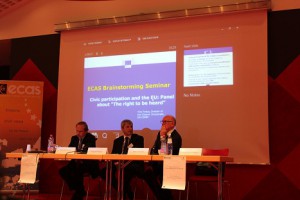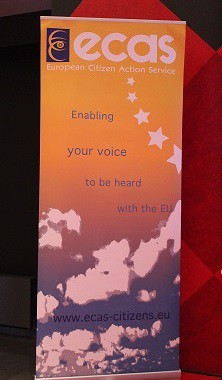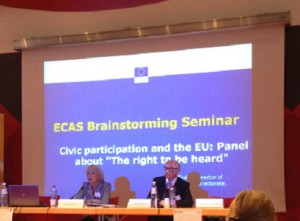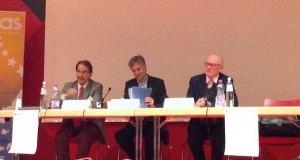The European Professionals Network (EPN) was pleased to participate in the ECAS Brainstorming Seminar ‘Civic Participation and the EU’ on December 2, 2013. The event was held by ECAS (European Citizens Action Service) at the Representation of Saxony-Anhalt to the EU.Dr.Henrike Franz welcomed the participants on behalf of the Ministry of Saxony Anhalt and raised the main question of the seminar: how can we get the people involved?
Should there be a new Treaty?
Assya Kavrakova, ECAS’ incoming Director, launched the debate by stating it was time to switch from the good governance concept to the open governance concept, which would imply adding up an essential component: citizens’ collaboration. In order to be an open governor, the EU should give the citizens the opportunity to become contributors and co producers of European policies and decisions. ECAS would like to test the application of this new concept at the EU level.
According to Andrew Duff, MEP and Co-Chairman of the Spinelli Group, this is a particularly bad time for conventional politics. The current crisis has been so devastating that it has transcendent classical politics and the conventional lines – which Europe has experienced for several decades – dividing the right and the left parties. Nowadays, a new frontline is opening up: nationalistvs federalists. Nevertheless, it is important to mention that we are experiencing a good time for civic politics. The power of citizens, which is expressed in an organised way across the international roof, has a chance to be heard as well as having an impact.
Today’s urgency is finding a way to overcome the current situation. In order to do so, Mr. Duff suggested the idea of reforming the Lisbon Treaty to rectify its weaknesses. Colleagues of the Spinelli group and himself have started the work and rewritten the entire Treaty. The main adjustment regards the creation of an EU government. According to the Spinelli group, the real problem of the EU is not the democratic deficit but the absence of an accountable and effective government, which leads to citizens’ distrust. Mr. Duff declared: “What we really need is a parliamentary government of the EU”! In order to reach such goal, the group suggests to reform the institutions and to transform the Commission into a real government.
2014 will be a critical year for two main reasons: the euro crisis will have to be settled and European elections conducted. In addition, the Parliament will insist on holding a Convention for federalist solutions. Questioned on his confidence regarding the drawing-up of a Convention, Mr. Duff explained that the Treaty gives the Parliament the right to insist upon one. Moreover, the trigger can be pulled by a majority of Member States and not necessarily all of them.
It would be a place and a time for citizens’ platforms to be assertive and active in promoting their proposals to improve the politics of a post-national Europe. A Convention would be a democratic ferment of reflexion and debate. The previous Conventions lacked in participation and interaction with the public. For the upcoming one, the civil society should engage itself. However, the problem with many NGO’s is that they are obsessed with their cause. It is important for the next Convention that the NGO understand that there is a bigger picture, a wider story to be written.
Tony Venables, ECAS’ Outgoing Director, agreed with Mr. Duff in regards to the NGOs. According to him, they often tend to ignore the broader agenda. That is why, civic participation should collaborate with an open administration.
Mr. Venables raised a crucial question: how has the European Union responded to the financial crisis in terms of its consultation process with its outside groups? Over the last five years, people have become far better informed and the awareness has increased. Nevertheless, there is a great opacity on what is going on with the number one issue. The financial crisis has been handled with a very low level of civic participation. Fortunately, the idea of citizens’ participation has become a pillar of the Commission objectives even if it is very difficult to implement. According to Mr. Venables, “We are in a situation where it is difficult to see the way forward. That’s the sense of this meeting, think about the agenda which could work”.
Yvla Tiveus, Director of the Citizens’ Directorate, DG COMM, is responsible for the European Year of Citizens. This programme was designed to create a European debate. Over 50 dialogues were organised across Europe to tackle different subjects, collect thoughts and create a direct exchange between the EU and its citizens. They worked closely with large NGOs and raised questions on specific issues. It is now crucial to make sure the process doesn’t stop at the end of the year. In order to avoid this from happening, Ms. Tiveus asserted they were waiting for recommendations from NGOs. If a Convention is going to be held, things will have to be handled differently than in the past. To be more precise, people will have to be consulted before and not after the decision has been taken. The Citizens’ Dialogue perfectly personalises this specific goal which can be defined as upstreaming consultation. According to Ms. Tiveus, many approaches are currently being developed to hear citizens’ voices at the EU level. Nowadays, only one third of the population feels informed and very few feel heard. Nevertheless, one must not lose hope when reading these statistics as citizens have expressed their willingness to stay up to date with European affairs.
The right to know
Fergal O’Regan, Head of Unit at European Ombudsman, explained how the work accomplished by the European Ombudsman greatly relies on the huge efforts carried out by civil society and NGOs. The Ombudsman is very unique, it can enter into a dialogue with the institutions and have significant long-term impact on the way they act.
According to Mr. O’Regan, transparency and civil society participation could be improved. However, the issue does not lie there. Member States benefit from a blind trust from their citizens which the EU does not possess and must try to gain. The right to know can thus be understood as a mean to achieve the right to be heard and to participate but also as an end in itself. Information is crucial to build trust.
Transparency should also be proactive and not only reactive. To be more precise, institutions should identify the information citizens are looking for and make it available to them. In addition, the information should be shared in a comprehensible and accessible way, which is not always the case.
Onno Brouwer, Partner at Freshfields Bruckhaus Deringer, went forward with the debate on transparency. In his opinion, ministries and institutions have justified and understandable reasons to keep sensitive documents secret. The real issue is that matters which do not need to be secret are hidden from citizens. In this case, it is essential for the EU to be more transparent in order to increase its legitimacy. Even though great progress has been made, access to documents hasn’t reached the suitable level of transparency, especially when it comes to international relations. Consequently, this has led to a lack of room for public debates.
In his opinion, ministries and institutions have justified and understandable reasons to keep sensitive documents secret. The real issue is that matters which do not need to be secret are hidden from citizens. In this case, it is essential for the EU to be more transparent in order to increase its legitimacy. Even though great progress has been made, access to documents hasn’t reached the suitable level of transparency, especially when it comes to international relations. Consequently, this has led to a lack of room for public debates.
The real problem is that agencies are not sanctioned when they don’t reply in time, which subsequently undermines the goal of transparency. In order to reach greater transparency, the procedure should be made easier and more accessible.
The right to participate
According to Gerald Hafner, MEP, democracy is ‘the core question of every political system’. The European Citizens’ Initiative (ECI) gives citizens the opportunity to bring their ideas, proposals and preoccupations at the EU level. The procedure still requires some improvements, i.e. more user-friendly ECIs, uniformized verification of signatures, etc. In addition, no time is counted to prepare the campaign and the deadline starts running from the moment the Commission gives its agreement. We are, however, moving forward a more participative EU. In Mr. Hafner’s opinion, what we need is an ECI which would further on lead to a European referendum.
Mario Tenreiro, Head Unit at the General Institutional Issues Secretariat-General of the European Commission, shared his thoughts on the ECI. The way he sees it, the ECI is not a perfect instrument but a good start. The negotiation of the ECI took place in a complex context characterised by result-orientated pressure and fear. The original proposal of the Commission was simpler. In 2015 an evaluation of the ECI will be processed and, hopefully, necessary improvements will be made.
Assya Kavrakova closed the event by drawing a conclusion on the key issues brought up during the seminar. The EPN team was pleased to attend this very interesting and interactive debate on a subject which, we hope, will continue to be developed and attract people’s attention.



